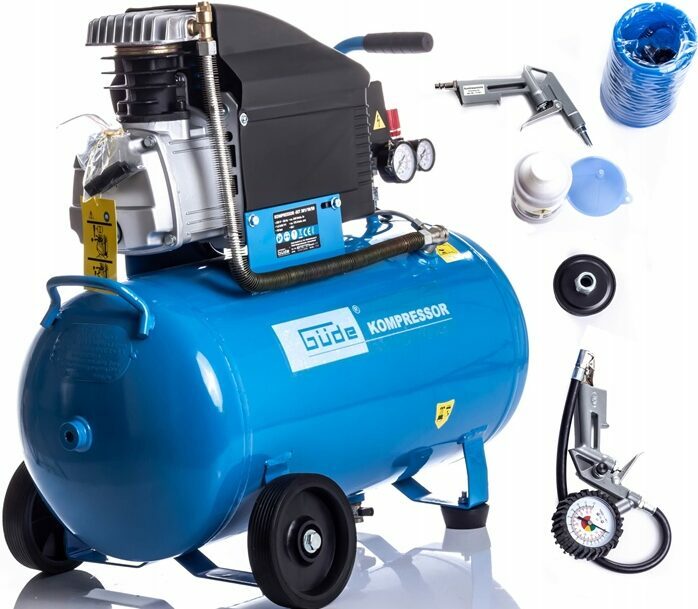A compressor is an indispensable device, which is indispensable neither in the garage, nor at the construction site, nor in production. It's just not so easy to choose a compressor, because there are a lot of them. We are often asked which compressor is better: oil or oil-free? Well, we'll figure it out now.
CONTENT
- 1 Air compressors: a brief educational program
- 2 What is the difference between oil and oil-free compressors
- 3 Features of operation of oil and oil-free compressors
- 4 Popular questions
- 5 conclusions
Air compressors: a brief educational program
A compressor is a device for pumping and pumping gas. In fact, this is one of the types of pumps, only designed to work not with liquids, but with air or other gases. Compressors are used in almost all areas of human life. The simplest and most portable are inflatable mattresses and car wheels - such devices are carried in the trunk by motorists. More powerful units power pneumatic tools and assist in painting machines and parts. The heaviest and most powerful compressors are used in construction sites and factories. In general, depending on the goals that a person pursues, each type of compressor finds its place. Accordingly, in order to choose the right compressor, you need to imagine what you need it for, otherwise it will not be long and confusing, because there are a whole lot of types of compressors.
There are positive displacement and dynamic compressors, electric and diesel, mobile and stationary. All these devices differ in their internal structure, and in the principle of operation, and in the method of power supply, and in a million other parameters. In this article, we are most interested in the difference between oil and oil-free compressors.
What is the difference between oil and oil-free compressors
Generally speaking, oil and oil-free compressors are very similar: the same power unit, the same piston group, the same crankshaft, the same drive system. In addition, it would be wrong to assume that oil-free compressors do not need oil or lubrication at all. Here, the matter is a little different: in oil compressors, the channels for lubrication and for liquid intersect, while in oil-free compressors they are isolated from each other.
Oil-immersed compressors require the filling of compressor oil into the crankshaft crankcase. The lubricating fluid is distributed throughout the insides of the apparatus and is directly involved in the process of pumping air. The oil level must be monitored, otherwise the compressor will not be able to work normally. Oil-free models do not require such care.
Advantages and Disadvantages of Oil Compressors
Oil-immersed compressors require proper care, first of all, it concerns the maintenance of the lubricant level. After each use, check the oil level and top up, if necessary, up to operating values. But this is what makes this type of compressor an extremely robust, powerful and efficient machine. Oil compressors, even non-industrial ones, are able to maintain the required pressure for a long time and work almost without interruption. Lubrication increases the service life and performance of compressor equipment to the limit. At the same time, oil particles will inevitably be present in the air pumped by these machines, so it is not possible to use oil compressors everywhere.
Advantages and Disadvantages of Oil-Free Compressors
Oil-free compressors also need lubrication, but their air and oil circuits, as mentioned above, do not intersect. Since oil is not directly involved in the pumping of air, the situation with lubrication and cooling in compressors of this type is not as rosy as in oil. They use modern materials with a low coefficient of friction, but the service life of oil-free devices is not too high. It is desirable that they work no more than 10-15 minutes per hour, otherwise overheating can easily lead to breakdown. The main advantages of this type of compressor are that they are much more compact, easier and easier to maintain than oil models. In addition, the air discharged by them is much cleaner, so that oil-free devices can be used in industries that are sensitive to the quality of the supplied gas.
Features of operation of oil and oil-free compressors

The inherent advantages and disadvantages of oil-lubricated compressors make them the most suitable for industrial and professional use. Since these units are capable of long-term operation, they are used in enterprises with a continuous production cycle. In addition, the high power makes oil compressors an indispensable piece of equipment in construction and other challenging environments. Finally, for painting, for example, cars, it is advisable to use oil compressors - the paint from the oil-free aggregates is bubbling due to the large amount of hydrogen in the supplied air.
Oil-free compressors are not as outstanding as their oil-based counterparts. However, they are lighter, more compact, unpretentious in maintenance, and most importantly, cheaper than oil ones. Therefore, devices of this type are best suited for work in the garage and in general in everyday life. They require almost no maintenance, and with careful use they can inflate tires for years, power the power tool and perform other daily work. In addition, the air supplied by these devices is much cleaner, therefore, for example, the pneumatic tools fed by them work longer and more reliably.
Popular questions
What compressor capacity is required for painting a car?
An oil compressor with a capacity of anywhere from 190 liters per minute is suitable for painting a car.
Are oil and oil-free compressors suitable for inflating tires?
Usually, simple oil-free compressors are used to inflate tires - they have enough capabilities for this.
conclusions
So which compressors are better: oil or oil-free? It all depends on your point of view and your needs. The production uses expensive, powerful and reliable oil apparatuses. In everyday life, inexpensive and easy-to-use oil-free look much better.


